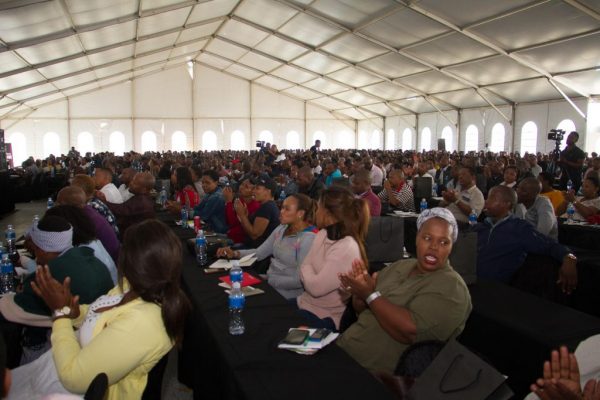SANRAL EXTENDS OLIVE BRANCH TO SMALLER CONTRACTORS, COMMUNITIES
The massive turnout at the South African National Roads Agency Limited’s (Sanral’s) N2/N3 information corridor roadshow across KwaZulu-Natal this week saw the roads agency extend an olive branch to local contractors and communities, as well as controversial business forums that had disrupted major construction projects, sometimes at gunpoint.
“We are not at war with you. When we go out to people, we get lambasted but we are prepared to take the blows . . . Sanral does not want to come with a big brother attitude. We come here in humility because we can learn from you,” Sanral chairperson Themba Barrange Mhambi told the large gathering in Durban on Thursday.
He, together with Sanral transformation officer Ismail Essa and Department of Transport road safety chief director Whitey Maphakela, conceded that 90% of contracts had, until now, been awarded to big businesses with Grade 9 Construction Industry Development Board (CIDB) gradings. This left small, medium-sized and microenterprises (SMMEs) to fight over the remainder of the contracts.
They promised that a far larger portion of the combined R30-billion-plus upgrade of the N2 between the Lovu river, near the old Durban airport to the south and Mdloti to the north, and the N3 between Durban and Pietermaritzburg, that would be rolled out over the next five to eight years, would benefit local communities.
They urged local businesses and communities to be innovative and said that opportunities transcended just construction and included supplying materials and services. Examples included road marking, the provision of security for various contractors’ camp sites, temporary offices and yards, and the supply of road signage, fencing, precast elements such as kerbing, side drains and temporary barriers.
An estimated R800-million will be needed for the sophisticated light-emitting-diode lighting for the N3 stretch and a further R300-million for the N2.
Portions of concrete bridges and other structures will also be supplied by smaller, black-owned businesses.
Mhambi encouraged SMMEs to share their challenges but also cautioned that, when sharing ideas and trying to find a middle ground, people needed to “criticise one another with decorum”.
Essa explained that tenders would now be reformulated and resized so that they could be awarded directly to smaller companies with lower CIDB ratings.
At the same time, Sanral would “stretch the envelope” and even exceed the stipulated 30% of work that needed to be subcontracted on some tenders, he added.
Mhambi said that, while removing “the gatekeepers” was essential as the cake was big enough for all, it was important to strike a balance when spreading work between large and smaller companies.
“We do not want big companies in the construction industry to collapse but we also do not want small black-owned companies to stay small. They must get big. So, let us not kill what we have, but let us nurture small companies,” he said.
He warned that, following President Cyril Ramaphosa’s State of the Nation Address on June 20, job preservation was a priority and the eradication of large construction companies would cost jobs that the country could not afford to lose. “But, if we do not support small companies, how do we create new jobs?”
Support for smaller and evolving businesses would come in the form of incubator and mentoring programmes, training, and MoUs that had been signed with manufacturers of large plant such as Bell Equipment and Barloworld and financial institutions such as Ithala Bank.
The latter would enable smaller contractors to hire plant that they could not afford to buy, as well as access much-needed finance at preferential rates.
Mhambi said one of the first roadblocks for small businesses was that many were unable to complete the complex tender documents. Sanral intended engaging directly with small businesses to enable them to do this.
Despite encouraging business forums and other concerned community members to engage with Sanral, he also cautioned that Sanral continued to operate within the framework of legislation, policies, processes and procedures which were put in place to ensure tenders were awarded to the right people.
“The system is designed to make sure that all are treated equally. That doesn’t mean we will be able to give everyone what they want but it is a system that is designed to spread the cake more evenly than before,” he said. https://www.engineeringnews.co.za/article/sanral-extends-olive-branch-to-smaller-contractors-communities-2019-06-28






